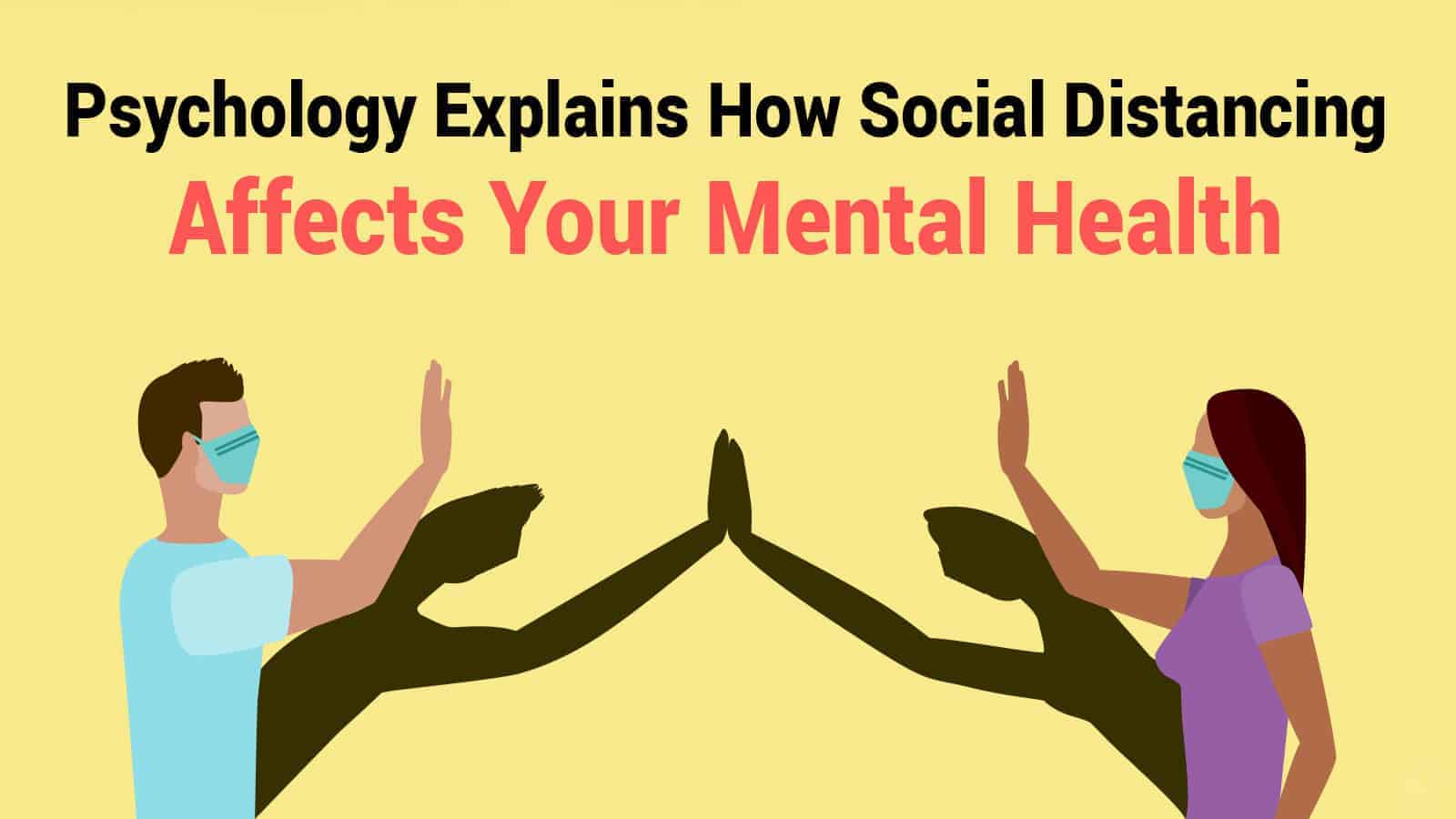With the current world situation, we’ve heard the term “social distancing” a lot. The global pandemic resulted in many people having to stay indoors, obeying new regulations put in place to curb the spread of disease.
If you’ve been on the Internet at all during this time – which you likely have! – then you’ll already know that there have been mixed responses to these new regulations. Notably, as happens to most current events when taken to an Internet space, there have been lots of jokes and memes surrounding social distancing.
More seriously, different people have different thoughts about social distancing. Some people are happy to obey the rules as they know it will keep everyone safe. Others are unsure if it will actually be effective. And, of course, the majority of people know that it’s what’s best, but are concerned about possible negative effects.
Unfortunately, social distancing, while needed, is not without its share of downsides. For those unused to isolation, it can potentially have severe effects on mental health – and that’s excluding the stress and anxiety that comes with living in a turbulent time, to begin with. Here’s how psychology explains how social distancing affects your mental health.
How Social Distancing Impacts Mental Health
1. What Is Social Distancing?
Social distancing refers to the act of reducing direct human-to-human interaction by increasing the amount of space between each individual. This can be done in a few ways, depending on the severity of the threat faced.
In some cases, social distancing can just be about keeping a relative distance and being more careful about contact with others. In more severe cases, social distancing works hand-in-hand with government mandates that involve much more strict developments. Social distancing, and its more severe forms, may involve:
- Standing apart from others at a 5-foot or higher distance, especially in public areas and while waiting in lines
- Limiting the number of people allowed into a location at a time
- Limiting the number of people allowed to travel per vehicle
- Introducing remote options for work and education
- Imposing curfews
- Closing establishments and locations that typically contain a relatively high number of people, such as eateries or swimming pools
- Banning gatherings of a certain amount of people or higher
- Stopping all services apart from essential services
- Enforcing movement restriction orders
- Enforcing full lockdowns that prevent individuals from leaving their homes
At the time of writing, a majority of the world is practicing social distancing due to a pandemic. This is, of course, to keep each person safe and prevent a further spread of a dangerous disease, and in the case of contagious diseases, it’s very necessary.
Despite its importance, social distancing does raise a few concerns. While it is absolutely crucial that those in affected areas follow social distancing rules and laws, it is also worth thinking about the possible effects that these very needed rules can have on individual health.
2. How Social Distancing Affects Your Mental Health
· Stress and Anxiety
When you’re locked up indoors and unable to contact anyone closely, it can lead to heightened feelings of anxiety, stress, and fear. This is especially true when social distancing is accompanied by anxiety-inducing circumstances, such as a pandemic.
· Depression
A lack of socializing is one of the factors in depressive risk. In fact, many people who do have depression benefit from social activities, as they boost their social skills, increase feel-good hormone production, and promote positive thinking. Being forced not to socialize can, then, have the opposite effect.
· Motivation and Productivity
For those who are used to going outdoors regularly, being stuck social distancing without close contact with people they know can negatively affect their ability to work. They may find their productivity slipping or be unable to drum up positive motivation.
· Trauma
When social distancing is attached to a traumatic time worldwide, it can result in symptoms of trauma developing, sometimes to the point of PTSD. Someone may become frightened or develop an emotional link to being alone or bad news due to the severity of the pain they experienced during their isolation.
· Anger
Anger is a secondary emotion, born out of a protective mechanism. The brain attempts to protect itself from the pain of the primary emotion, such as fear or sadness and turns it into anger. This can be difficult to manage, as it is not the emotion at its most base.
· Turning To Vices
When someone is dealing with mental health trouble, they are more likely to turn to unhealthy coping mechanisms. This can include drinking alcohol, smoking, or simply engaging in non-sustainable or toxic methods to deal with a number of emotions.
· Cognitive Strength
Long-term social distancing could have severe and potentially permanent degenerative effects on the brain, especially in older individuals. Socializing can help to keep the brain sharp and active as one ages, whereas a lack of it can speed up degeneration.
3. Studies Done Into Mental Health In Social Distancing
Here are a number of studies that make clear the dangers social distancing and isolation can cause:
-
“The psychological impact of quarantine and how to reduce it: a rapid review of the evidence”
This paper was published in The Lancet in February 2020. It shows that among 2,760 individuals in a quarantined situation during an outbreak of equine flu, 34% experienced higher amounts of anxiety, depression, and psychological distress on the whole. For those not in quarantine, the percentage of those with decreased positive thinking dropped to 12%.
This paper was published in the Emerging Infectious Diseases journal in July 2004. It examined the impact of 129 individuals who were quarantined in Toronto, Canada during the SARS outbreak. PTSD symptoms were seen in 28.9% of them, and 31.2% of them showed signs of depression. PTSD symptoms became more prevalent with longer quarantine durations.
-
“Mental health status of people isolated due to Middle East Respiratory Syndrome”
This paper was published in the Journal of Epidemiology and Community Health in November 2016. The paper investigated 1,692 individuals who were isolated due to MERS after being in contact with those who contracted MERS. Among the 1,656 who did not end up testing positive for MERS, 16.6% expressed feelings of anger and 7.6% displayed anxiety symptoms. Even half a year later, 6.4% still had those angry feelings and 3% still had symptoms of anxiety.
This paper was published in the Perspectives on Psychological Science journal in March 2015. The study found that those living in social isolation had a 29% increased mortality rate, while those experiencing loneliness had a 26% increase and those living alone had a 32% increase.
-
“Psychological well-being in elderly adults with extraordinary episodic memory”
This paper was published in the PLOS One journal in October 2017. It showed that those who age with better psychological wellbeing tend to have positive and fulfilling social circles.
There are also studies that clearly indicate how social interaction can promote better health and overall. Multiple research papers and experts have revealed that direct social interaction, such as touching, hugging, holding hands, and even being in another person’s close company, and do things like lower blood pressure, reduce disease risk, and improve overall wellbeing.
4. How The Most At-Risk Groups Are Even More At Risk
Sadly, groups who are already at-risk become even more at risk during these times. For example, older individuals are more at risk of complications from disease and have a higher mortality rate when contracting a virus, but social distancing already puts even more of them at risk.
Older individuals typically have less day-to-day socialization regardless of social distancing mandates. Almost 25% of all elderly individuals aged 65 and over experience some degree of social isolation, typically meaning that they already have few interactions with other individuals. Among this group, 40% of those aged 60 or older say that they feel lonely, too. This means that the elderly are already suffering ill-effects from social isolation, and social distancing can make it much worse.
In addition, the elderly, very young, immunocompromised, and those with underlying conditions are already quite at risk for developing complications from the disease. These individuals are also more likely to need medical care that is unrelated to a pandemic, and in isolation, they could have difficulty receiving it. This is made worse by the fact that they will likely also have trouble finding safe healthcare when all medical workers are busy, and being exposed to a hospital environment could potentially increase the risk of contracting diseases.
5. Tips To Cope With Social Distancing
If you are in a situation where you have to socially isolate, you’ll likely be concerned for your mental health and emotional wellbeing. Here are some tips to keep your positive thinking up during these trying times:
- Develop a daily routine. This will help things feel more in control.
- Take advantage of technology. Reach out to loved ones, plan “hangouts” on group video chat platforms with friends, and stay active in online communities.
- Exercise regularly. Make sure you get a good amount of physical activity. Even simply walking around your house is better than sitting all day.
- Keep your mind busy. Read books, learn new things, take the time to go back to an old hobby, or play games.
- Maintain good hygiene. You’ll feel much better if and when you’re clean.
- Try mindfulness meditation. You will find plenty of videos to follow online!
- If you live with others, balance time with them and time alone well.
Final Thoughts On How Social Distancing Affects Your Mental Health
Social distancing can be difficult, especially people separated from loved ones or whose normal relaxation and coping mechanisms have been disrupted. It can be tough to manage the isolation, no matter how necessary you know it is.
If you are experiencing severe adverse mental effects from social distancing, remember that you are not alone. In times like these, multiple mental health aid hotlines and live chatrooms are available online, and there are also plenty of online communities of people who are going through the same thing. Don’t be afraid to reach out for help!
In addition, don’t discount the help that can come from those you love or care about. If you live alone, you can contact the people you love with all the wonders that the Internet has to offer. Plus, they will also be very happy to hear from you now and then as they try to manage their own social isolation. Social distancing often comes with frightening times, but when you realize you’re not alone, it can get much easier to weather the trying times.



















